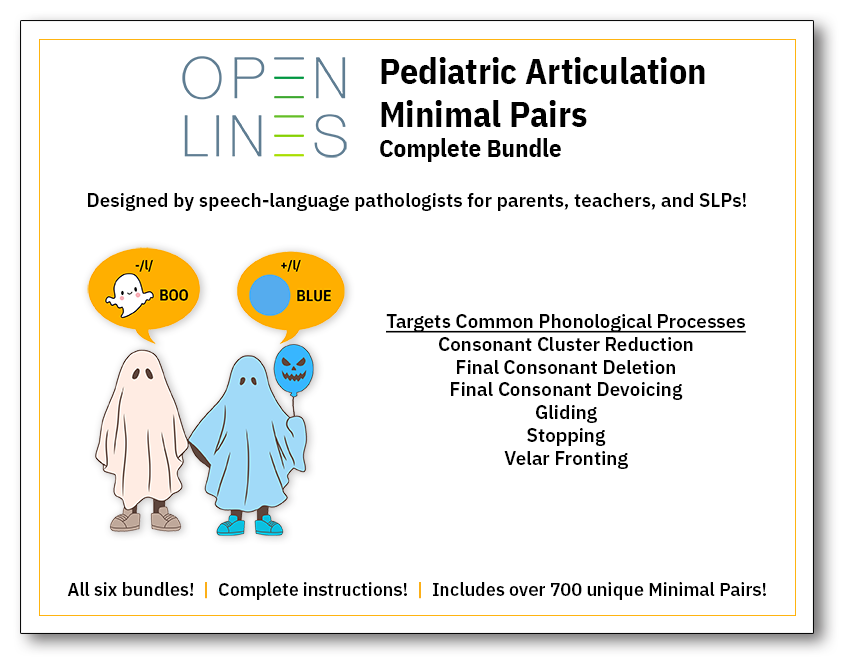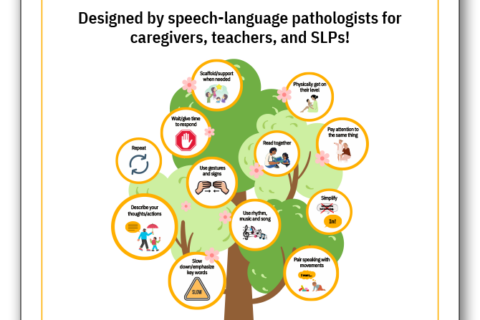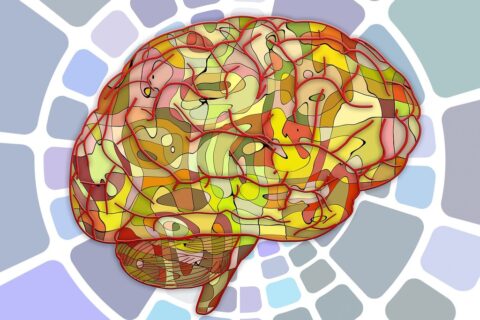Articulation Therapy: Speech Therapy Exercises to Enhance Your Child’s Speech with Open Lines’ Minimal Pairs Product

At Open Lines, we are passionately committed to elevating standards of excellence by offering practical yet innovative solutions that strengthen communication to increase confidence and wellbeing.
We are thrilled to introduce our latest collection of articulation therapy exercises: Minimal Pairs Picture Cards and accompanying speech therapy exercises. Meticulously designed and developed by our team of expert licensed pediatric speech therapists, this product offers scientifically founded approaches to address common developmental speech and articulation challenges including phonological processes.
What Is an Articulation Delay or Disorder :
Articulation delays or disorders occur when children continue to have difficulty producing sounds that are expected to be mastered at a certain age. This can make it hard to understand their speech and lead to frustration with talking.
In the early stages of learning to speak, children often exhibit immature speech motor coordination. Consequently, they frequently substitute certain sounds for another, while others may distort or omit sounds. Sometimes, only a few speech sounds are affected. Other times, children may use predictable error patterns called phonological processes. A phonological process refers to patterns of sound errors children use to simplify adult speech.
This could look like a child simplifying words with multiple syllables (e.g., saying “nana” instead of “banana”). Sometimes, a child may substitute certain sounds with ones that are easier for them to produce (e.g., saying “tup” instead of “cup”). These tendencies to simplify and substitute sounds in words follow predictable patterns and are considered typical and expected during young children’s speech development.
These speech patterns usually fade away between the ages of 3 and 4 as children gain more experience and practice with speech and develop adult-like articulation. However, in some cases, these patterns persist beyond the usual age of elimination. This can impede a child’s ability to communicate effectively and may pose challenges as their sentences become longer and more complex. In some cases, it may impact their relationships, interactions with peers, and their confidence in expressing ideas.
If your child, at the age of 3, is not understood by friends, teachers, and family members at least 75% of the time, it may be appropriate to seek an evaluation by a licensed speech-language pathologist. This assessment will determine whether your child’s speech skills are tracking with their age and development or whether they could benefit from support to bolster their speech articulation development.
While articulation delays and disorders may initially cause concern for families, we want to assure you that they can be effectively addressed with appropriate articulation therapy and targeted speech therapy exercises, leading to age appropriate speech clarity and confidence in communication.
Product Description:
Children presenting with articulation delays and phonological processes benefit from additional support to hear, recognize, and discriminate certain sounds in words. Minimal pairs are pairs of words that differ by a single speech sound resulting in a change in a word’s meaning. For example, Can and Tan where the words differ only by the initial sound of the word. In Cup and Cub, the words differ only by their final sound. By presenting children with pictures of word pairs that differ by a single speech sound, children quickly recognize that the way they say their sounds matters! When children improve their awareness and recognition of differences in speech sounds, they improve their ability to produce those sounds.
Open Lines’ Minimal Pairs Picture Card approach is an evidenced-based articulation therapy technique that helps children say certain sounds. It works by showing them pairs of words that differ only by one phoneme (sound), but have completely different meanings. This helps children tell the difference between sounds and say them correctly.
What makes Open Line’s product unique:
– Organized by target speech sounds AND phonological process patterns.
– Features highly engaging images
– Contains multiple word pairs of the same target sound. Target sounds appear in the initial and final position of words.
This gives children significantly more targeted practice with the specific sounds and articulation patterns they are working on. This multisensory articulation therapy approach engages visual, auditory, cognitive, and motor pathways to help children quickly make the connection between differences in sounds, their associated meanings, and how to say them.
It’s an ideal product to use with children who are targeting one or many speech sounds, or, who may be having difficulty progressing in their articulation development because of reduced awareness of how sounds make up words (phonological awareness).
This product is available as a complete bundle that includes all of the following phonological processes or purchase each process separately at the links below:
- Phonological processes and sounds targeted:
- Velar Fronting
- /k/–/t/ (e.g., “Can” vs. “Tan”)
- /g/–/d/ (e.g., “Go” vs. “Doe”)
- Final Consonant Deletion (e.g., “Plane” vs. “Play”)
- Final Consonant Devoicing (e.g., “Bug” vs. “Buck”)
- Stopping
- /f/–/p/ (e.g., “Cough” vs. “Cop”)
- /f/–/b/ (e.g., “Phone” vs. “Bone”)
- /s/–/t/ (e.g., “Sew” vs. “Toe”)
- /s/–/d/ (e.g., “Sun” vs. “Done”)
- /z/–/d/ (e.g., “Zoo” vs. “Do”)
- /v/–/b/ (e.g., “Vest” vs. “Best”)
- /sh/–/t/ (e.g., “Shoe” vs. “Two”)
- /ch/–/t/ (e.g., “Catch” vs. “Cat”)
- “juh”-/d/ (e.g., “Jog” vs. “Dog”)
- “th”–/d/ (e.g., “They” vs. “Day”)
- Consonant Cluster Reduction
- /s/ clusters (e.g., “Snail” vs. “Sail”)
- /l/ clusters (e.g., “Blue” vs. “Boo”)
- /r/ clusters (e.g., “Frog” vs. “Fog”)
- Gliding
- /l/–/w/ (e.g., “Lay” vs. “Way”)
- /r/–/w/ (e.g., “One” vs. “Run”)
- Velar Fronting
- Corresponding picture cards.
- Clear instructions for practice activities in caregiver-friendly language.
A Product for Families:
The Minimal Pairs Picture Cards articulation therapy product is designed to help your child quickly learn that the way they say their sounds matters–and how to say them!
Like learning any skill in life, it takes practice and lots of repetition. At Open Lines, we believe that speech therapy exercises need to be fun (or it won’t happen). That’s why this product comes complete with suggestions for games and activities that can be played with these decks in order to foster opportunities for family connection, increased sensory engagement, and maximize repetitions of practice.
We’ve also composed easy to follow instructions describing articulation therapy strategies to cue and help your child so you feel confident that you’re appropriately supporting your child’s development in a way that will improve their clarity and confidence with communication!
Knowing that every child’s needs are unique, we’ve made this product available for purchase as a bundle for those working on multiple speech sounds or by specific speech sounds.
Integrating The Minimal Pairs Product in Your Professional Setting:
Designed with the busy family, educator, and SLP in mind, our Minimal Pairs articulation therapy picture cards and speech therapy exercises require no preparation, offering a hassle-free, high-quality solution to enhance therapy sessions.
Available for individual purchase or as part of a convenient bundle, our product is meticulously designed to increase sensory engagement when addressing common articulation delays including phonological processes.
Uniquely organized by target speech sounds AND phonological processes, our minimal pairs picture cards articulation therapy approach quickly develops children’s ability to recognize differences between speech sounds by presenting pairs of words that differ by only one sound, yet carry entirely distinct meanings. Furthermore, our product offers a wealth of word pairs in both initial and final positions of words.
Whether your child or client is grappling with multiple processes or struggling to progress through the articulation hierarchy due to limited phonological awareness, our resources provide targeted support.
Additionally, each activity includes caregiver-friendly instructions, fostering collaboration and continuity of care beyond the therapy room. Elevate your therapy sessions with our engaging, effective minimal pairs resources.
Our Minimal Pairs Complete Bundle product includes:
- Minimal pairs of common phonological processes with the target sound in initial and final position
- Velar Fronting (k–t; g–d)
- Final Consonant Deletion
- Final Consonant Devoicing
- Consonant Cluster Reduction (s clusters; l clusters; r clusters)
- Stopping (f–b; f–p; s–d, s–t, z–d, v–b, sh–t, ch–t, juh–d, th–d)
- Gliding (l–w; r–w)
- Corresponding picture cards
- Suggested instructions for practice activity in caregiver-friendly language
Curious about other articulation therapy resources and speech therapy exercises? Check out other products and helpful information on speech therapy for kids here: https://www.openlines.com/free-speech-therapy-exercises-and-resources-for-children/
Looking for a resource that you don’t see here? Let us know! We’d love to help. Reach out to us here: https://www.openlines.com/contact-us/
Get in Touch With Open Lines®














